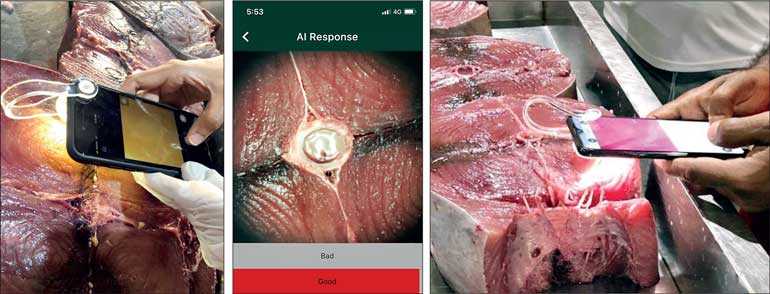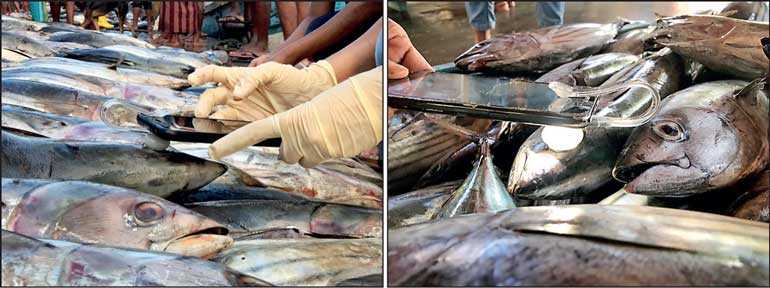Friday Feb 27, 2026
Friday Feb 27, 2026
Friday, 23 April 2021 00:00 - - {{hitsCtrl.values.hits}}

The United Nations’ Food and Agriculture Organisation estimates that up to one-third of global primary produce is wasted. Minimising food wastage could bring significant benefits to many people around the world.
Issues around food freshness and storage are a critical component in this context. For instance, more than 30% of the fish landed on Sri Lanka’s shores are considered spoilt, according to NARA, Sri Lanka’s National Aquatic Resources Research and Development Agency. The lack of fishing boat cold storage facilities is compounded by the need to fish further out into the seas as stocks of Indian Ocean tuna dwindle. Consequently, sourcing fresh tuna is a major problem for retailers in Sri Lanka as assessing the quality of tuna is critical.
Assessing tuna is a fine art. It takes about 20 years to train a tuna master who can grade tuna accurately into various grades. Even the best machine vison technologies have thus far found accurate grading a challenge.
Now, GoMicro – an Australian Deep Tech company – has managed to differentiate good tuna from spoilt tuna with a high degree of confidence using Artificial Intelligence.
“Keells has now tested GoMicro AI to assess the quality of Yellowfin Tuna. GoMicro AI can accurately differentiate fresh tuna from tuna that is spoilt. This technology gives us an opportunity to enhance our ability to guarantee the quality of tuna to our customers,” said John Keells Group Head of Fresh Food/Vice President Mifrah Ismail.
After six months of development at assessing tuna at the Keells seafood procurement centre in Wattala, GoMicro’s patent pending AI assessment technology has finally cracked the problem. It is now able to match the judgment of Keells’ tuna experts in differentiating good tuna from the tuna that is likely to be spoiled by the time it reaches the retail store.
This will not only increase consumer confidence in the quality of tuna sold by Keells, but it will considerably reduce waste. The economic implications are significant in high-value seafood which spoil quickly, partially in countries where logistics and cold storage facilities are not well developed.
GoMicro also carried out experiments with the National Aquatic Resources Research and Development Agency of Sri Lanka to assess if AI can detect the freshness of fish by assessing its eyes – as consumers often do.
GoMicro’s AI engine scored 80% accuracy in assessing the state of the landed skipjack tuna solely by assessing its eyes. GoMicro is also working with a company based at the Sydney Fish Market to grade oysters accurately – which have been previously graded by eye, introducing an element of subjectivity that GoMicro interests to remove.
The accuracy of AI technologies increases over time with increased data and improvements in algorithms. There have been many previous attempts at AI assessment of seafood globally but until now they have not succeeded in achieving the accuracies required for commercial deployment. GoMicro AI has now crossed this line, making it viable for anyone with a phone and GoMicro devices to assess the quality and freshness of the seafood.
The $ 40 billion global tuna industry is hampered by overfishing and dwindling stock. Technologies such as GoMicro’s AI bring a dynamic driver for improved efficiency in lessening wastage and ensuring sustainability of the sea food sector.
“We at Keells are continuously on the look out to adopt new processes and technology in our quest to provide customers with the right quality and freshness. The use of AI is a step in this direction,” said Mifrah Ismail.
“The GoMicro platform is an exciting example of the successful integration of key technologies (mobile, microscopy, machine learning and interpretive data analyses) to deliver next generation AI solutions aimed at improving Australian fisheries, agriculture’s production systems, biosecurity vigilance and protection,” said Professor Rob Lewis, former CEO of the South Australian Research and Development Institute (SARDI).
“Together, the latest in AI software for recognising the contents of magnified images all on a smart phone is a powerful combination,” added Associate Professor Mark McDonnell, Machine Learning Expert (commented in a private capacity, without reference to his current employer UNISA).
“We are able to achieve high accuracies using a much smaller number of training images than our competition, due to our patented phone – based magnifier,” said CTO and Co-Founder Jarrad Law. “GoMicro’s accurate quality assessment capability can help significantly reduce food waste now estimated to be $ 1 trillion,” added GoMicro CEO Sivam Krish.
Sensibility Ltd., is the Adelaide company that developed the platform (AI technology and the phone magnifier). The company is incubated at the New Venture Institute @ Flinders University Tonsley.
